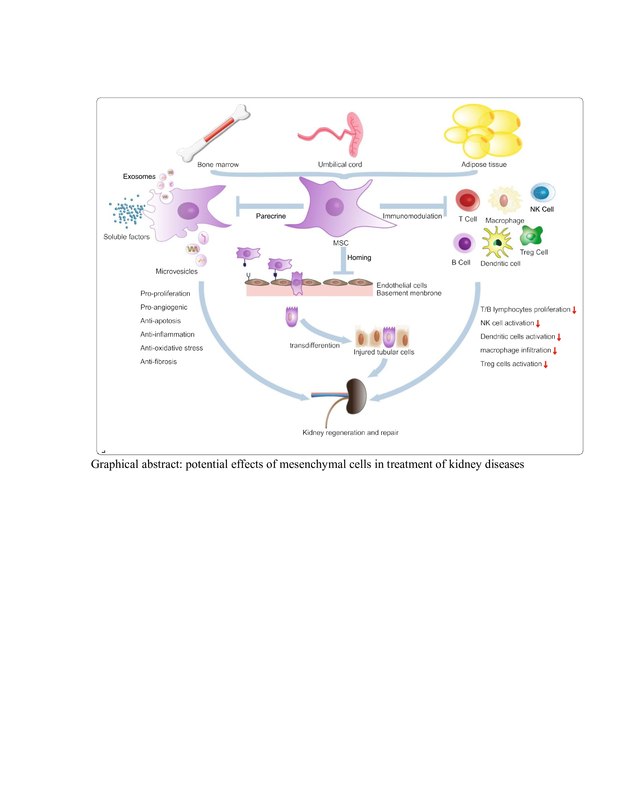Current issue
Archive
Manuscripts accepted
About the Journal
Editorial office
Editorial board
Section Editors
Abstracting and indexing
Subscription
Contact
Ethical standards and procedures
Most read articles
Instructions for authors
Article Processing Charge (APC)
Regulations of paying article processing charge (APC)
NEPHROLOGY / RESEARCH PAPER
Therapeutic Potential of Mesenchymal Stem Cells in Cisplatin-Induced Acute Kidney Injury via ASK-1/TXNIP Pathway Modulation
1
October University for Modern Sciences and Arts, October, Egypt., Egypt
2
Faculty of Pharmacy, October University for Modern Sciences and Arts (MSA), Egypt
Submission date: 2024-04-24
Final revision date: 2024-09-02
Acceptance date: 2024-09-25
Online publication date: 2024-11-02
Corresponding author
KEYWORDS
TOPICS
ABSTRACT
Introduction:
Acute kidney injury (AKI) is a diverse set of illnesses characterized by a rapid decline in kidney function
Material and methods:
Characteristics and homing of MSCs to kidney tissues were identified by flow cytometry and differentiation capability. After AKI induction by cisplatin injection in sixteen albino rats, the AKI rats were further subdivided into three subgroups. The first subgroup served as a positive control and the second one received 2 mg/kg furosemide (FUR) which served as a standard drug. The third subgroup received a single dose of 5 x 106 MSCs via tail vein injection once a week for consecutive two weeks. AKI-related biochemical parameters were assayed at 2 weeks after MSC treatment. Kidney histological changes were also evaluated. Moreover, the apoptosis of kidney cells and expression of apoptosis-related proteins were assessed by western blot.
Results:
Compared with AKI rats, rats treated with MSCs showed suppressed serum levels of creatinine and blood urea nitrogen. MSC treatment alleviated the pathological abnormalities in the kidneys of AKI rats as shown by H&E staining.Furthermore, MSC treatment suppressed apoptosis of kidney cells in AKI rats via downregulation of apoptotic proteins; thioredoxin-interacting protein (TXNIP) and apoptosis signal-regulating kinase 1 (ASK1). Most importantly, MSC treatment promoted the expression of vascular endothelial growth factor (VEGF) in the kidneys of AKI rats.
Conclusions:
Our results suggest that MSCs could ameliorate renal injury of AKI rats via their antiapoptotic properties. Also, the protective effects of MSCs may be mediated by their angiogenic potential effects.
Acute kidney injury (AKI) is a diverse set of illnesses characterized by a rapid decline in kidney function
Material and methods:
Characteristics and homing of MSCs to kidney tissues were identified by flow cytometry and differentiation capability. After AKI induction by cisplatin injection in sixteen albino rats, the AKI rats were further subdivided into three subgroups. The first subgroup served as a positive control and the second one received 2 mg/kg furosemide (FUR) which served as a standard drug. The third subgroup received a single dose of 5 x 106 MSCs via tail vein injection once a week for consecutive two weeks. AKI-related biochemical parameters were assayed at 2 weeks after MSC treatment. Kidney histological changes were also evaluated. Moreover, the apoptosis of kidney cells and expression of apoptosis-related proteins were assessed by western blot.
Results:
Compared with AKI rats, rats treated with MSCs showed suppressed serum levels of creatinine and blood urea nitrogen. MSC treatment alleviated the pathological abnormalities in the kidneys of AKI rats as shown by H&E staining.Furthermore, MSC treatment suppressed apoptosis of kidney cells in AKI rats via downregulation of apoptotic proteins; thioredoxin-interacting protein (TXNIP) and apoptosis signal-regulating kinase 1 (ASK1). Most importantly, MSC treatment promoted the expression of vascular endothelial growth factor (VEGF) in the kidneys of AKI rats.
Conclusions:
Our results suggest that MSCs could ameliorate renal injury of AKI rats via their antiapoptotic properties. Also, the protective effects of MSCs may be mediated by their angiogenic potential effects.
Share
RELATED ARTICLE
We process personal data collected when visiting the website. The function of obtaining information about users and their behavior is carried out by voluntarily entered information in forms and saving cookies in end devices. Data, including cookies, are used to provide services, improve the user experience and to analyze the traffic in accordance with the Privacy policy. Data are also collected and processed by Google Analytics tool (more).
You can change cookies settings in your browser. Restricted use of cookies in the browser configuration may affect some functionalities of the website.
You can change cookies settings in your browser. Restricted use of cookies in the browser configuration may affect some functionalities of the website.



